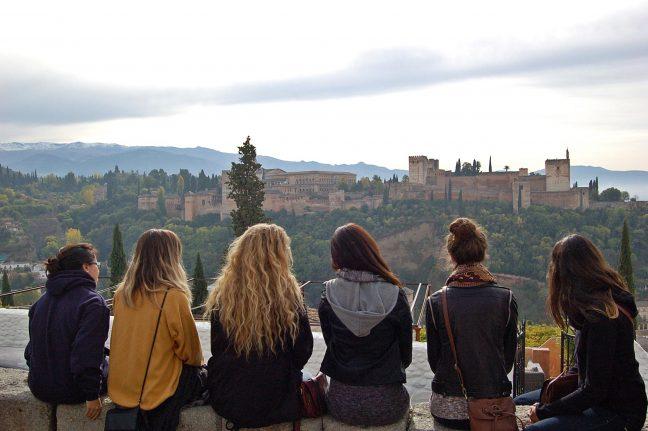I spent fall 2016 studying abroad in Seville, Spain. From across the ocean, I watched as President Donald Trump was elected. I listened to Spaniards quote satirical “Simpsons” episodes, making fun of Americans. I weathered all the American stereotypes thrown at me. Now I’m back, and being an American feels different. Here are some of my observations.
To be honest, a lot of things initially confused me about Spanish culture, but something I never really figured out was where everybody went to study. There existed no analog to College Library there — no buildings dedicated solely to students or solely to studying. When I needed to write a paper or learn how Chile was emancipated from Spain, I had a difficult time finding a quiet, comfortable place with Wi-Fi to do it.
I asked Spanish friends where to go and they’d direct me to the department libraries within our university building — decent-sized rooms with bookshelves along the back wall and rows of tables lined with reading lamps. Despite the cracked windows, the rooms were generally stuffy and smelled bad. They seated no more than 70 people, and were rarely more than half full. The study rooms closed at 9 p.m., but usually cleared out around 7. On the weekends, the university was closed.
Throughout the semester, I explored the university building, discovering more and more of these rooms, but they were usually fairly empty. It seemed students only went to the study rooms when they needed to waste time between classes, not when they actually needed to do work.
When I became fed up with the warm, stale air or when I needed to do homework on a Sunday, I had to look outside the university. I tried to find a cute little café to camp out in, but I quickly discovered the Spaniards take their coffee seriously. They drink it strong and they use it as an excuse to socialize. The tiny tables are filled with boisterous conversations, not quiet studiers. To discourage squatters with laptops, the cafés only offered 30 minutes of Wi-Fi — my favorite café turned off their Wi-Fi altogether on Sundays. In general, the cafés were loud, the strong coffee made me jittery and I didn’t have Wifi to translate confusing Spanish words.
I heard about a mythical 24-hour study room in the tourism studies building and set off to find it the week before finals. I walked 40 minutes from my house, creepily followed two girls wearing backpacks who I assumed knew more than I did and eventually found my way to another small, stuffy room. I settled in, proud I had finally found the secret place where all the Spaniards studied. But around 10 p.m., they all started to clear out.
Spanish students don’t use their tiny university library rooms, they don’t study in cafés and they don’t even stay in their 24-hour study room. The majority of them stop studying at 7 p.m. They don’t share the American college tradition of camping out at the library for eight hours straight on a Sunday. The concept of binge-studying is so foreign to them, they don’t even have the buildings or rooms to do it in.
To be fair, a lot of Spaniards study at home — it’s not as if they don’t ever do any homework.
Still, the way they handle the stress, workload and overwhelming amount of content thrown at them is entirely different than we do. School is a 9-to-5 job, with nights and weekends off. Occasionally, work overflows into their normal lives, but in general they know how to switch out of school mode.
In contrast, American college students purchase massive cups of weak coffee to take to strange, huge buildings dedicated solely to studying. They remain there, sitting and staring at a laptop, wired on caffeine, until they become loopy with mental fatigue. They post Snapchat stories with a time stamp of the empty library like medals of honor, declaring their hard work and begging for recognition.
I wish we could all just take a deep breath and back away from the practice tests. I wish we could appreciate the challenge of our coursework without succumbing to the need to bury ourselves in it and compete to be the most sleep-deprived.
Finally, we should take a moment to thank God and UW Chancellor Rebecca Blank for College Library, Memorial Library and the Student Activity Center, because studying there is immeasurably better than spending Sundays café-hopping to piece together 3 hours of Wi-Fi while glaring at small Spanish children for talking too loudly.


